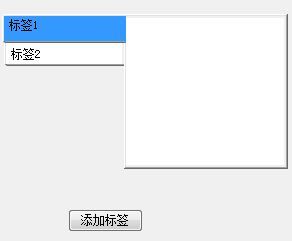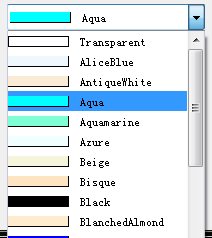C#的WinForm有一些控件具备自绘的功能,这就意味着你可以对这些控件进行自绘,可以起到意想不到的视觉效果。本文所述的以下控件就是通过一些简单的控件转变过来的。具体示例如下:
1、横向选项卡重绘:
这里的“横向”对话框其实是通过一个TabControl进行“方向旋转”、重绘控件项等操作进行实现的。步骤如下:
①.Alignment:用于控制选项卡的方向(设置为Left)。
②.SizeMode:用于调整每个选项卡,默认是Normal(非自绘模式),此处应该设置为Fixed(固定模式),则允许自绘。
③.设置ItemSize(注意每一个选项卡因为是“横向”的,但是这些单元卡的Width或者是Height确实按照原来“竖向”的选项卡进行处理的。因此Height其实是横向选项卡的“宽度”,而Width确实选项卡的“高度”,注意不要混淆)。
④.最后重绘DrawItem,这一步也就是最重要的(为了显示文字)。每次Draw_Item会在创建了TabPage之后被调用。此时你应该设定绘制文字的起始点(定义X,Y)。
具体实现代码如下:
C#部分代码:
private void tabControl1_DrawItem(object sender, DrawItemEventArgs e)
{
e.DrawFocusRectangle();
e.DrawBackground();
e.Graphics.DrawString("标签" + (e.Index + 1), SystemFonts.DefaultFont, Brushes.Black, new PointF(e.Bounds.X + 5, e.Bounds.Y +
5));
}
VB.NET页面部分代码:
Private Sub tabControl1_DrawItem(sender As Object, e As DrawItemEventArgs)
e.DrawFocusRectangle()
e.DrawBackground()
e.Graphics.DrawString("标签" & Convert.ToString((e.Index + 1)), SystemFonts.DefaultFont, Brushes.Black, New PointF(e.Bounds.X + 5, e.Bounds.Y + 5))
End Sub
注意:程序的DrawFocusRectangle和DrawBackGound分别是绘制聚焦虚框和选定一个选项卡之后背景变成蓝色。如果省略则无法呈现选中的效果。
2、颜色选项卡重绘:
Combobox和TabControl一样每一个Item都可以重绘。重要属性如下:
①.ItemHeight:设置每项项目的重绘高度。
②.DrawMode:重绘样式(分为:Normal一般模式,不支持重绘;OwnerDrawFixed:自绘模式,固定高度,OwnerDrawVariable:自绘模式,可以在MesureItem中重新为每一项调整高度进行绘制)。
③.重绘Draw_Item。
全部代码如下:
C#部分代码:
public partial class Form1 : Form
{
///
/// 绑定下拉列表的Color类
///
private class ColorInfo
{
///
/// 颜色名称
///
public string ColorName { get; set; }
///
/// 对应的Color实体
///
public Color Color { get; set; }
public static List GetAllColors()
{
Color c = new Color();
List Colors = new List();
foreach (var item in c.GetType().GetProperties())
{
//排除非颜色的情况
if (item.GetValue(c, null) is Color)
{
Colors.Add(new ColorInfo { ColorName = item.Name, Color = (Color)item.GetValue(c, null) });
}
}
return Colors;
}
}
public Form1()
{
InitializeComponent();
comboBox1.DataSource = ColorInfo.GetAllColors();
comboBox1.DisplayMember = "ColorName";
comboBox1.ValueMember = "Color";
}
private void comboBox1_DrawItem(object sender, DrawItemEventArgs e)
{
e.DrawBackground();
e.DrawFocusRectangle();
//绘制空心矩形框,起始点(0,5),宽度60,高度10
Rectangle r = new Rectangle(e.Bounds.X, e.Bounds.Y+5, 60, 10);
//外框是黑色
e.Graphics.DrawRectangle(new Pen(Color.Black),r);
//内框用枚举出来的颜色填充
e.Graphics.FillRectangle(new SolidBrush((comboBox1.DataSource as List)[e.Index].Color), r);
//绘制颜色名称,起始点每项都是Item中(70,5)
e.Graphics.DrawString((comboBox1.DataSource as List)[e.Index].ColorName, SystemFonts.DefaultFont, Brushes.Black, new PointF(e.Bounds.X + 70, e.Bounds.Y + 5));
}
}
VB.NET页面部分代码:
Public Partial Class Form1 Inherits Form '''''' 绑定下拉列表的Color类 ''' Private Class ColorInfo '''''' 颜色名称 ''' Public Property ColorName() As String Get Return m_ColorName End Get Set m_ColorName = Value End Set End Property Private m_ColorName As String '''''' 对应的Color实体 ''' Public Property Color() As Color Get Return m_Color End Get Set m_Color = Value End Set End Property Private m_Color As Color Public Shared Function GetAllColors() As List(Of ColorInfo) Dim c As New Color() Dim Colors As New List(Of ColorInfo)() For Each item As var In c.[GetType]().GetProperties() '排除非颜色的情况 If TypeOf item.GetValue(c, Nothing) Is Color Then Colors.Add(New ColorInfo() With { _ Key .ColorName = item.Name, _ Key .Color = DirectCast(item.GetValue(c, Nothing), Color) _ }) End If Next Return Colors End Function End Class Public Sub New() InitializeComponent() comboBox1.DataSource = ColorInfo.GetAllColors() comboBox1.DisplayMember = "ColorName" comboBox1.ValueMember = "Color" End Sub Private Sub comboBox1_DrawItem(sender As Object, e As DrawItemEventArgs) e.DrawBackground() e.DrawFocusRectangle() '绘制空心矩形框,起始点(0,5),宽度60,高度10 Dim r As New Rectangle(e.Bounds.X, e.Bounds.Y + 5, 60, 10) '外框是黑色 e.Graphics.DrawRectangle(New Pen(Color.Black), r) '内框用枚举出来的颜色填充 e.Graphics.FillRectangle(New SolidBrush(TryCast(comboBox1.DataSource, List(Of ColorInfo))(e.Index).Color), r) '绘制颜色名称,起始点每项都是Item中(70,5) e.Graphics.DrawString(TryCast(comboBox1.DataSource, List(Of ColorInfo))(e.Index).ColorName, SystemFonts.DefaultFont, Brushes.Black, New PointF(e.Bounds.X + 70, e.Bounds.Y + 5)) End Sub End Class

